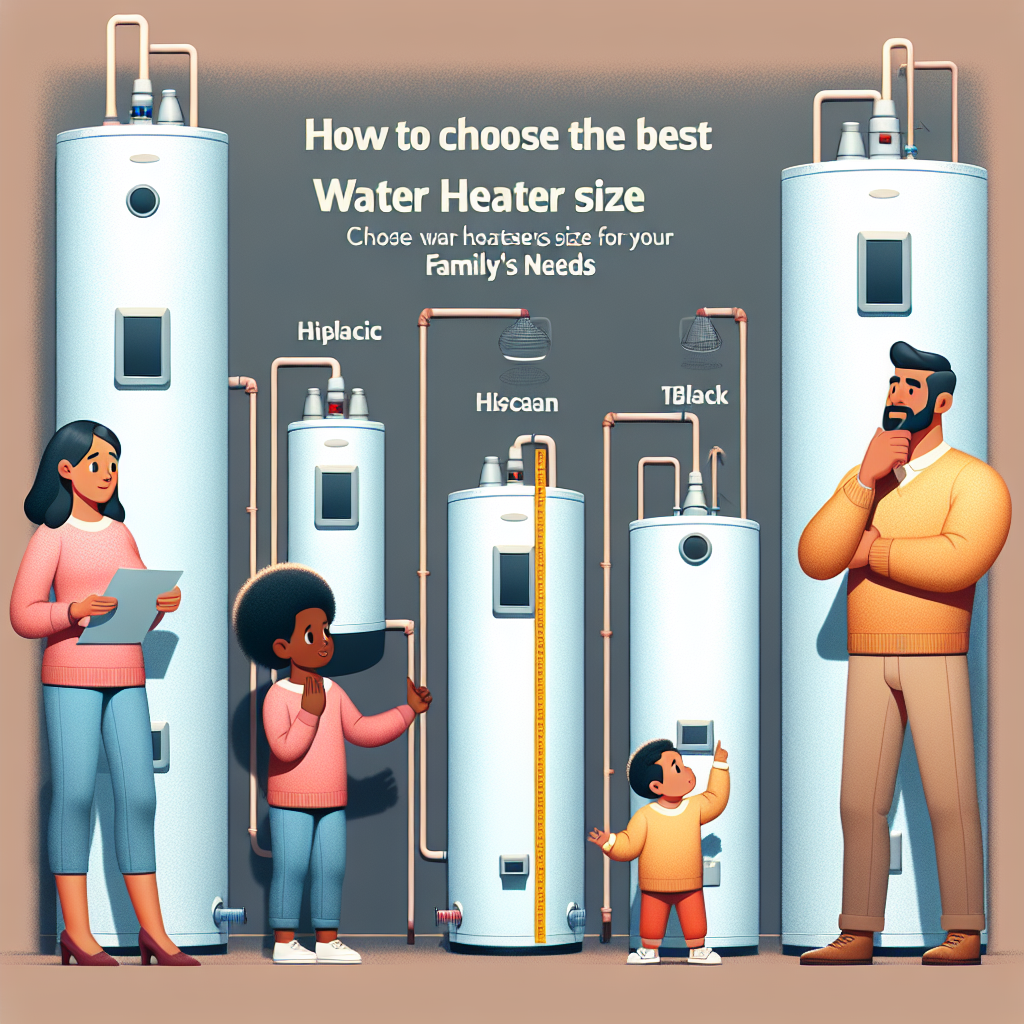Choosing the right water heater size for your family is more crucial than you might think. A properly sized water heater ensures comfort, efficiency, and savings on your utility bills. Whether you are remodeling your home, upgrading your appliances, or just trying to find a more efficient solution, understanding how to select the appropriate water heater size can make all the difference. In this article, we’ll break down what you need to know to make an informed decision.
Understand Your Hot Water Demand
Assess Your Household Needs
The first step in determining the right size for your water heater is understanding how much hot water you typically consume. Consider the following questions:
- How many family members are living in your home?
- What time of day do you use hot water the most?
- What appliances or fixtures rely on hot water?
Typically, a family of four will use around 64 gallons of hot water daily. Having an estimate of your daily usage can provide a solid foundation for choosing the right size.
Daily Hot Water Usage Calculation
To calculate your household’s hot water usage, consider the following averages:
- Showers: 2 gallons per minute (15-20 minutes)
- Baths: 30 gallons per bath
- Kitchen sink: 2-3 gallons per use
- Dishwasher: 6-10 gallons per load
- Washing machine: 15-30 gallons per load
For example, if four people each take a 15-minute shower daily, that alone would lead to approximately 120 gallons just from showers!
Types of Water Heaters: Tank vs. Tankless
Traditional Tank Water Heaters
Traditional tank water heaters store a certain amount of hot water (commonly 30 to 80 gallons) and keep it heated, ready for use. They work effectively for households with high hot water usage at consistent times (like morning routines).
Tankless Water Heaters
Tankless water heaters, also known as on-demand water heaters, heat water directly as it flows through the unit. These systems offer endless hot water and can be more energy-efficient. However, they are typically best for families who don’t have high simultaneous hot water demands.
Sizing Your Water Heater
For Storage Tank Heaters
When sizing a traditional tank water heater, consider the first-hour rating (FHR) or the recovery rate, which indicates how much hot water the unit can produce in an hour while maintaining the desired temperature. Choose a water heater that can meet or exceed your hourly demand.
- Small households (1-2 people): 30-40 gallons
- Medium households (3-4 people): 40-50 gallons
- Large households (5+ people): 60-80 gallons
For Tankless Heaters
When sizing a tankless water heater, focus on the flow rate (gallons per minute, GPM) and the temperature rise needed. A tankless water heater’s flow rate must match or exceed simultaneous hot water demands.
- Low demand (1-2 fixtures simultaneously): 3-5 GPM
- Moderate demand (2-3 fixtures simultaneously): 5-7 GPM
- High demand (3+ fixtures simultaneously): 7-10 GPM
Energy Efficiency and Fuel Types
Consider Fuel Type
Water heaters come in various fuel types—electric, gas, propane, and solar. Your choice may affect not only the efficiency but also installation costs. Gas models usually heat water faster and can be more economical than electric versions, depending on local energy costs.
Look for Energy Efficiency Ratings
Choosing an energy-efficient model can save your family money in the long run. Look for the Energy Factor (EF) rating; the higher the EF, the more efficient the water heater is. Energy-efficient models may have higher upfront costs but typically result in lower utility bills.
Professional Installation and Maintenance
Don’t Skimp on Installation
Once you’ve chosen the right water heater size, it’s advisable to hire a licensed professional for installation. They can ensure that the unit is installed correctly, follows local codes, and minimizes energy loss.
Routine Maintenance Matters
Regular maintenance can extend the life of your water heater and ensure optimal performance. Flushing the tank annually, checking for leaks, and inspecting the anode rod are good practices.
Conclusion
Choosing the best water heater size for your family’s needs doesn’t have to be a daunting task. By assessing your hot water demand, understanding the types of heaters available, sizing your choice correctly, considering your fuel options, and opting for professional installation, you can ensure comfort and efficiency in your home. Remember, a little planning today can lead to significant savings and satisfaction tomorrow! If you’re unsure, consulting with a water heating professional can provide further personalized guidance.
With this comprehensive guide, you’ll be well-equipped to select the perfect water heater for your family’s lifestyle, ensuring you never run out of hot water when you need it most!


